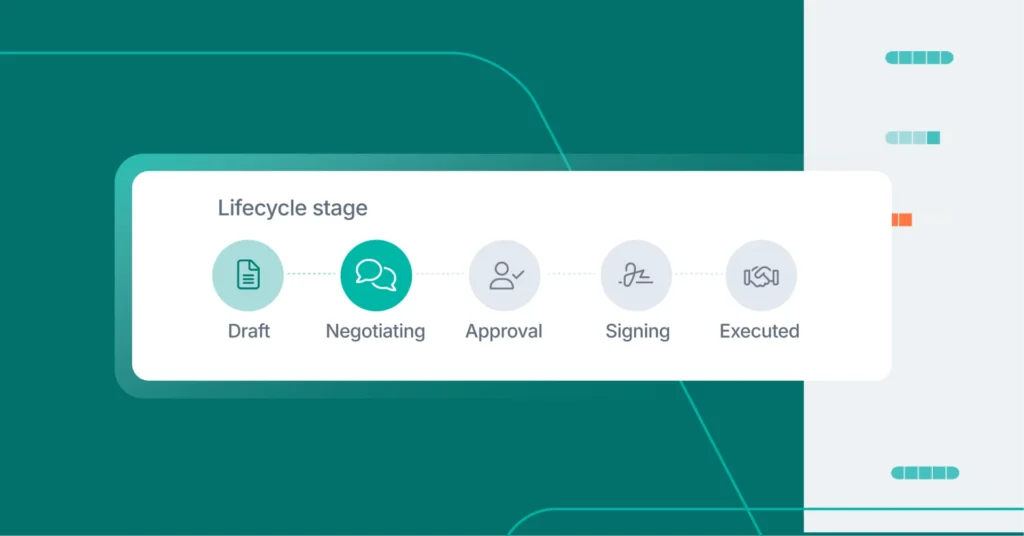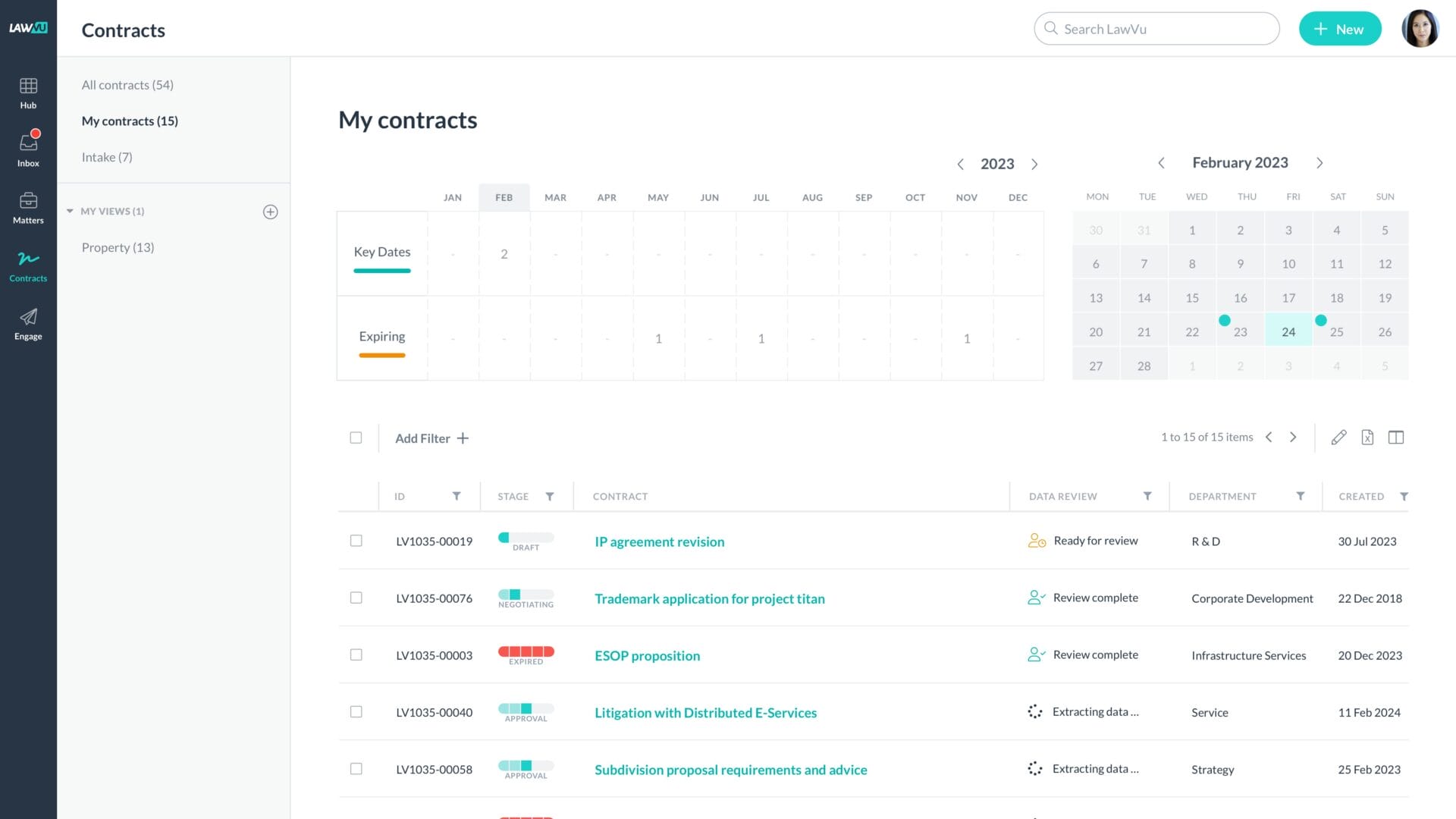Contract management software: CLM Software, features and best practices

If you’re reading this it’s probably because you’re wondering what contract management software (CLM) is, how it works and what effective contract management software can do for you and your legal team.
Rewinding things back a bit, contract management is the process of managing everything pertaining to contract lifecycle management (CLM) – that is, contract creation, execution, and analysis. It includes everything from tracking and monitoring contract review and delivery, associated costs, and managing risks and relationships. Therefore, contract management software is the technology that enables you to do this, digitally.
Let’s dive into some of the fundamentals of contract management software.
Why is contract management software important?
Legal teams have become essential pillars of modern business, managing the ever-increasing complexities of the corporate landscape. Tasked with handling high volumes of contract work, legal teams are expected to deliver precision and quality while maintaining operational excellence. Often serving as key stakeholders—or even primary owners—of the CLM process, legal teams play a critical role in ensuring contracts meet legal requirements and align with strategic business objectives. This dual responsibility highlights their broad influence: not only protecting organizations from legal risks but also driving efficiencies and outcomes that contribute to overall business success.
That’s why getting your CLM right is crucial for both legal and the wider business. Without suitable contract management software or systems in place, a businesses success can be impacted.
The risks of manual or, not having contract management software
Without contract management software, busy in-house lawyers are saddled with the administrative task of tracking and double-checking the contract-related minutiae and the only members of the team with visibility of the contracts, there are some key risks for the business also.
Manual errors
Manual contracts open up the risk of clerical errors. These could lead the company to legal and financial risks associated with contractual non-compliance, jeopardised customer relationships and missed revenue opportunities.
Time and money lost
According to the 2024 In-house Legal Technology Report, 35 percent of in-house legal professionals spend 3 hours or more per day drafting or reviewing low-risk or routine contracts. That’s a lot of legal time and resources sacrificed to the administration required by manual contract management. Broader than legal, it can also mean significant delays in clients getting necessary answers or feedback. Bottlenecks from manual CLM can also trigger extended sales cycles, and the business potentially missing out on revenue opportunities.
The benefits of contract management software
Effective contract management software has redefined how businesses handle their contracts. By streamlining processes, reducing manual workloads, and providing valuable insights, it empowers legal teams to work smarter, not harder. From improving compliance and mitigating risks to enhancing collaboration and driving better business results, the advantages are clear.
Below, we’ll explore the key benefits that make contract management software an essential tool for both in-house legal teams and the wider business.
Faster contract turnaround time
Having a contract template at the ready, which can be easily modified with just a few clicks, is always going to be much more efficient than having to hand-type a contract from scratch or manually modifying a template.
A digital system also speeds up drafting and executing contracts at scale. The collaboration, negotiation and the signature of such contracts are a breeze in comparison as modification can be made and the contracts can be signed instantaneously.
Walking around the office with a paper contract for signing is a thing of the past.
Lastly, whenever a contract needs to be referred to by any of the team members, searching through digitally stored contracts takes a fraction of the time that wading through paperwork and rows of cabinets does.
Commercial wins
By accelerating contract processes with an effective Contract Lifecycle Management (CLM) system, businesses can streamline operations and get to revenue faster. This helps reduce delays often caused by lengthy sales cycles, allowing teams to close deals more efficiently. An effective CLM also ensures that businesses avoid missed obligations, such as payment deadlines or compliance requirements, which can otherwise lead to costly penalties or damaged relationships. Additionally, implementing a CLM saves valuable time for legal, sales, and operations teams by automating routine tasks, enabling them to focus on higher-value work and strategic priorities.
Better contract management means better collaboration
Instead of the prehistoric method of contract amendment where the smallest clerical error like a date or address change requires lawyers to tweak the Word doc, reprint it and send it over again in the post, contract management software allows for changes to be made immediately to the contract. It’s also incredibly easy to share that contract through a link to any of the stakeholders who need to review or sign the contract.
Secure
A contract protected through passcodes and some hefty cyber security encryptions will always be much more secure than a contract locked up physically in the filing cabinet of someone’s office. The digital contract is both secure in the sense of security, but unlike a physical contract is also safe from any unforeseen physical events like earthquakes, fires or floods which could leave parties in the awkward position of not fully knowing what their rights, obligations and remedies are towards each other.
Contract management metrics and reporting
Regardless of your organization’s size, contracts contain information vital to your client and business relationships, internal resourcing and risk management strategy – not to mention your balance sheet. Not having the technology in place to easily report of your CLM can be blocker, hindering your ability to understand past trends, optimize your present legal function, and influence business outcomes going forward.
The best part is that with contract management software in place, it should be able to collect, and present all the contract metrics and reporting needed just by doing the day-to-day tasks involved in contract management. Imagine the time savings and operational decisions that could be made with a contract turnaround time dashboard!
Business-wide contract repository

A contract repository held within contract management software offers businesses numerous benefits, including enhanced security, improved compliance, streamlined collaboration, and easier CLM, all while reducing risks and costs.
Some other benefits of having a business-wide contract repository within your contract management software include:
- Centralized storage and access with a single source of truth: A repository acts as a central location for all contracts, ensuring that everyone has access to the latest versions and information.
- Reduced risk of misplacement: A centralized contract repository eliminates the chaos of contracts scattered across various filing systems, minimizing the risk of misplaced or overlooked agreements.
- Easy retrieval: Contracts are easily searchable and accessible, saving time and resources when locating specific information.
Contract management and matter management, together
While a contract management software will prove to be beneficial, it’s well worth considering a contract management software that also includes matter management capabilities. There are several reasons as to why combining contract management and matter management is the way to go for in-house legal teams, but if we were to pick a few;
- Managing contracts and matters together reduces costs,
- Yields unique time savings,
- Amplifies workflow efficiency,
- Means greater context for the work you do,
- Richer legal data and analytics,
- Greater self-service, collaboration and transparency for business partners,
- And the ability to better leverage workflow automations including AI.
Who can use contract management software?
The key users of contract management software are the in-house legal team, the human resources department, the sales team, the procurement division and finance team. Where all team members can easily access contracts for review or referral, contract management software helps the company’s various teams more effectively and efficiently close employment contracts, sign vendor agreements, oversee billing and keep track of contract renewals.
The seven stages of CLM in contract management software
A typical commercial contract can include various key stages such as request, creation, collaboration, negotiation, execution, tracking, revision, and renewal of the contract. Effective contract management software can aid in improving outcomes at each stage of the contract workflow.
1.Contract request
The contract management process begins with a request to create a new contract or amend an existing contract. Where requests and contracts are managed in a centralized contract management software this process is sped up.
2.Contract creation
Many lawyers still store their contracts in Word documents on their computers, copying and pasting from a template or a similar contract to draft a new contract. This method opens up the risk of clerical errors, the lawyer potentially missing or mistyping a date, address or other matter. Where contract management software can help is with the functionality that allows you to create templates for common contracts requested by the wider business. For example, a non-legally trained administrator can easily create draft versions of commonly used contracts such as NDAs using your company’s templates, so simple high volume contracts can be automatically create without legal involvement (or risk).
3. Contract collaboration
A contract often requires a few team members and even wider business departments to collaborate before it is ready to present to the contracting party. When stakeholders can see tracked changes, document versions, tasks, approvals and comments against contracts in a centralized contract management software, transparency and collaboration becomes much easier. Plus, you also have a historical record of decisions and interactions if you ever needed them.
4. Contract negotiation
Once drafted, a contract is ready to be negotiated with the other contracting party. Clearly tracking changes in the contract and being to identify discrepancies between versions may reduce time spent negotiating. A contract management software should be able to automate tasks like routing contracts for review and approval, ensuring that everyone involved in the agreement is made aware of changes during negotiations.
5. Contract execution
When all parties are satisfied with the contract, the parties can speed up the signing of the contract by circumventing posting or physically delivering contracts and using electronic signatures nestled in your contract management software instead.
Integrations with commonly used tools such as DocuSign and HelloSign make digital execution a breeze for all parties and signed versions are automatically sent to stakeholders. Your contract management software should also allow for the configuration of automated workflows, such as establishing a signing order, adding signers, and sending reminders, ensuring a smooth execution process.
6. Contracts tracking
Now that the contract is afoot, project managers and other key stakeholders are required to ensure that all deliverables are being met and all obligations and expectations are being managed. Quick referrals to the original contract may be useful at this stage. Contract audits are highly important in ensuring contractual compliance with all the terms set out in the contract. Contract management software can help identify and mitigate potential risks associated with real-time visibility into contract performance and obligations and provide reporting and analytics capabilities for your business. This can help you gain insights into your CLM performance and identify areas for improvement.
7. Contract revision
Where there isn’t a coherent contract management software in place, finding any original documents related to the contract’s initial drafting to check contractual intent or support the variation of terms is another taxing task which gets piled onto the lawyer’s already crowded desk. Contract management software should often include real-time editing and red-lining capabilities, allowing the legal team to make contract amendments and add comments directly within the contract, eliminating the needs for multiple systems and email exchanges.
8.Contract renewal & expiry
Where contracts are not managed in a contract management software, there is a risk that a company misses a renewal opportunity and the corresponding revenue. You’ll never miss an expiry or renewal date again with a effective contract management software in place. Contract management software can also help identify and mitigate potential risks associated with contract execution by providing real-time visibility into contract performance and obligations, pushing people to timely action with reminders.
If we haven’t already made it clear, the digitization of contract management with contract management software and even further, the introduction of contract automation, has changed the way we oversee, execute, track and renew contracts. Where an in-house legal team isn’t equipped with contract management software, it poses a wide variety of financial and legal risks and inefficiencies for both the legal team and the wider business.
A great contract management software ensures accuracy, streamlined collaboration, efficiency, security and scalability for all contracts and perhaps even potential revenue opportunities.
Ready to learn more about contract management software?
With contracts being a vital part of most business operations, and contract management making up a significant portion of the workload for in-house legal teams, the contract management software you invest in needs to cater to your legal team and the wider business. And now that we’ve uncovered the fundamentals of contract management software and CLM, you might be ready to explore some of the tools available to in-house legal teams.
To help you evaluate your current approach to CLM or even, the contract management software you have in play, we’ve created this guide showcasing the benefits of contract management that you should be experiencing (or may not be). It might be time to rethink your investment! Or, you can learn more about the fundamentals of contract management, including contract and matter management use cases and tips and tricks as part of the Legal Tech Fundamentals Certification. It’s free and can be completed in your own time!
